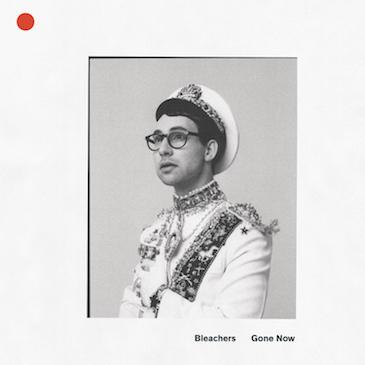Bleachers' 'Gone Now' Is An Unexpected Concept Album, Full Of Fist-Pumps & Feelings
By Tankboy in Arts & Entertainment on Jun 2, 2017 2:44PM
Jack Antonoff has come a long way from fronting the relatively scrappy Steel Train, then updating that band’s melodic instincts with the more straightforward pop hooks of fun. When he finally struck off on his own to form Bleachers, the resulting sound made total sense; steeped in the ‘80s, emotionally straightforward, and not at all subtle. Admittedly, Antonoff can be so emotive and over the top at places it could play as parody, but you just can't shake the fact he means it. You believe it, and you fall into his thrall.
On the debut Strange Desire, this approach resulted in a big rock album that was all sleeveless T-shirts and smiles, all the while admitting that the best times only exist because the worst times came just before. But the album didn’t have a cohesive thematic approach. Strange Desire wasn’t particularly mysterious, but it’s honesty held it together and made it enjoyable simply as a solid pop collection. There was no overarching message, but who cared when the candy was this sweet?
 So, we can agree that Antonoff does grand, sweeping vistas of nostalgia best, and Bleachers' new album Gone Now certainly capitalizes on his strengths in that area. Built on teenage and early 20-something memories, it largely traverses in subject matter that’s melancholy—failing relationships, the death of his sister, realizing emotions are scary as you grow up—which plays in lockstep with his melancholic melodic tendencies. But this doesn’t appear to be as simple as a mild grappling with the anxieties of youth.
So, we can agree that Antonoff does grand, sweeping vistas of nostalgia best, and Bleachers' new album Gone Now certainly capitalizes on his strengths in that area. Built on teenage and early 20-something memories, it largely traverses in subject matter that’s melancholy—failing relationships, the death of his sister, realizing emotions are scary as you grow up—which plays in lockstep with his melancholic melodic tendencies. But this doesn’t appear to be as simple as a mild grappling with the anxieties of youth.
Gone Now start to show its cards by repeating instrumental motifs throughout the album; measures from one song creep into another, and lyrics from one song echo lyrics in another. Once you take a step back and experience the album as a whole you realize Antonoff has created something that veers pretty close to “concept album” territory. This ambition can’t help but bring renewed scrutiny to the work, and a closer look reveals that Gone Now is truly swinging for deeper fields.
As Antonoff takes a trip through his younger years a story comes into focus. There’s the preamble of “Dream Of Mickey Mantle” which sets the scene in Antonoff’s childhood bedroom, and this allows the rest of the set pieces to unspool from that location. The next song “Goodmorning” lurches into the future and is either describing a crumbling relationship marked by drunken stumbling in the street, or works as an allegory for unsaid apologies to the deceased. Antonoff couches the narrative in such a way that it’s open to interpretation. The first time you hear the song you’re too busy humming along to its devilishly catchy earworm qualities that the starkness of the subject matter manages to obscure itself.
And the album continues in this vein. On the single “Hate That You Know Me,” the line “Sometimes I hate that you know me so well / some days I wish that I wasn’t myself / and I hate that you know me so well” could be voiced to a family member or a lover. Either way it’s an uncomfortable sentiment made palatable by a sweet electronic pop backing that feels like a solid fit for an indie club dance floor.
Later on, “Let’s Get Married” seems to have a more obvious target, based on the simplistic title, but the desire for a lifelong commitment could also be read as a plea to family, all the while driven by a pseudo ‘80s groove that would have made Jim Steimann proud. But it’s the ambiguity of the subject matter, and how it could work as a truly funereal remembrance or the mourning of love lost, that imbues the song with more weight than the frothy production might otherwise convey.
The entire album pulls in these directions simultaneously, until we get some closure and peace with the one-two punch of Gone Now’s closers “I’m Ready To Move On/Mickey Mantle Reprise” and “Foreign Girls.” The former mournfully answers the questions set out by the opening track. But “Foreign Girls”—borrowing from sounds set last year by Kanye West and Chance The Rapper—leaves the listener on a peaceful plateau as Antonoff comes to terms with everything the album’s protagonist has gone through:
Goodbye to the friends I had
Goodbye to my upstairs neighbor
Goodbye to the dream downstairs and
Anybody who lent me a favor
Goodbye to the way we talk
Goodbye to the things we bought
You should know that
I loved you all
Gone Now is at times bombastic, but its intentions are always vulnerable and tender. I’ve been sitting with this album for a while now, and each time I listen the clichés Antanoff seems to employ ultimately end up unexpectedly triggering deeper emotional responses. The album’s simple pleasures draw forth complicated feelings, and Antonoff’s genius at imbuing his music that appears crowd pleasing on the surface with threads of honest communication that slip into the ears and tug at the heart, proves its mettle.
I know understand why Antonoff is following this album’s release with a tour of his actual teenage bedroom; he wants to bring us back to the place where it began so we can all sit on the floor amidst his dirty laundry and process the past along with him. Because we’ve all felt this way at one point, and we’ve all had to process the same feelings, even if they had different triggers.
And in the end, we all made it, smiling, fists pumping along to the fading webs of all we wrestled with in our earlier years. Gone Now is just the sonic equivalent of that experience.
Bleachers Gone Now is out today and the band is on tour now.
